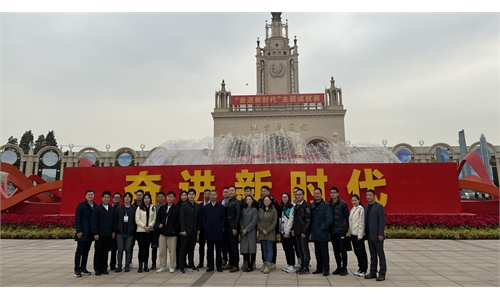
Graphic: Deng Zijun/GT
Resolving the Taiwan question and realizing China's complete reunification is a shared aspiration of the Chinese people and an unavoidable requirement for the great rejuvenation of the nation. In General Secretary Xi Jinping's report to the 20th National Congress of the Communist Party of China (CPC), the commitment to national reunification was demonstrated and the promotion of cross-Straits exchanges and cooperation was highlighted. We are more confident than ever that the wheel of history rolls on toward national reunification, a process that cannot be halted by any individual or any force.
As an inalienable part of China, Taiwan has belonged to it since ancient times. This is an indisputable fact which has sound basis in history and jurisprudence. Archeological discoveries and historical records regularly attest to the profound ties between the two sides of the straits. The earliest references can be traced back to the year 230 in the Three Kingdoms Period, and administrative bodies exercising jurisdiction over Penghu and Taiwan set up by Chinese central governments date back to the Song and Yuan dynasties. It was only in the modern era, due to the aggression of Western powers, that the Taiwan question arose as a result of weakness and chaos in China.
Chinese culture forges close bonds between the people on both sides of the straits and lies deep in their genes. That explains why in a recent exhibition themed "Forging Ahead in the New Era" in Beijing, young students from Taiwan lingered in the Henan Province section and closely examined a Paotong Guqin, a local stringed instrument made of Paulownia wood. Excited by the beauty of traditional art, they highly appreciated the countless cultural heritage items and showed great interest in seeing an all-round view of the country.
Over the past decades, the mainland has continuously promoted economic and cultural exchanges and cooperation across the Taiwan Straits. People on both sides of the straits have worked together to de-escalate tensions, making many breakthroughs and a great deal of progress in improving cross-Straits relations. Increased exchanges, broader cooperation and closer interactions have brought tangible benefits to people across the straits.
For example, the volume of cross-Straits trade was only $46 million in 1978. It rose to $328.34 billion in 2021. The mainland has been Taiwan's largest export market for the last 21 years, generating a large annual surplus for the island. The mainland is also the largest destination for Taiwan's off-island investment. By the end of 2021, Taiwan businesses had invested a total of $71.34 billion in the mainland.
In 1987, less than 50,000 visits were made between the two sides, but by 2019 this number had soared to about 9 million. In the past three years, affected by COVID-19, online communication has become the main form of people-to-people interactions across the straits, and the number of people participating in and covered by online communication is reaching new highs.
For various historical reasons, Taiwan has not yet reunified with the motherland, and follows a socioeconomic development model that is significantly different from the mainland's. Many Taiwan compatriots also lack understanding and first-hand experience of the mainland's existing system.
Fundamental guidelines on the Taiwan question have always been observed and implemented. According to a white paper titled "The Taiwan Question and China's Reunification in the New Era" released in August this year, peaceful reunification and "one country, two systems" are our basic principles for resolving the Taiwan question and the best approach to realize national reunification. This has taken full account of Taiwan's realities, and is in the best interests of the Chinese people, including Taiwan compatriots, and conducive to the nation's long-term development. It can be realized through integrated development and negotiation across the straits on the basis of the 1992 Consensus that there is only one China.
Once peaceful reunification is achieved under "one country, two systems," it will create huge opportunities for social and economic development in Taiwan and bring tangible benefits to its people. Systems and mechanisms for economic cooperation across the Taiwan Straits will be further improved, and industrial and supply chains will become steadier and smoother. Many problems that have long plagued Taiwan's economy and its people can be resolved through integrated cross-Straits development. Taiwan's cultural creativity will also be given a great boost.
Taiwan's social system and way of life will be fully respected, and the private property, religious beliefs, and lawful rights and interests of Taiwan compatriots will be fully protected. Taiwan compatriots will also have a vast space for development and enjoy greater security and dignity in the international community. Efforts will be made to advance integrated development in all fields, and improve systems and policies that contribute to the well-being of Taiwan compatriots.
Meanwhile, there are still obstacles to be overcome in the process of peaceful reunification. The actions of the Democratic Progressive Party (DPP) authorities have resulted in tensions in cross-Straits relations, endangering peace and stability in the Taiwan Straits, and undermining the prospects for peaceful reunification. External forces have encouraged and instigated provocative actions by the separatist forces. These have intensified cross-Straits tensions and undermined peace and stability in the region, which run counter to the global trends of peace, development and win-win cooperation, and go against the wishes of the international community.
People know with full certainty that relying on external forces will achieve nothing for Taiwan's separatists, and using Taiwan island to contain China is doomed to fail. The recent defeat of the DPP in local elections in Taiwan reflected Taiwan people's desire for a good life and their distrust of the party's governance. We can see that the public in Taiwan is generally dissatisfied with the performance of the DPP and tired of its electoral campaigns. Analysts say that the DPP's strategy of constantly creating tensions between the mainland and the island is not popular with people in Taiwan, who have realized that the party is unable to promote stability and peaceful development across the straits.
To protect the interests of the Chinese nation as a whole, we must resolutely oppose separatism and work for peaceful reunification. We are ready to create a vast space for peaceful reunification, but will leave no room for separatist activities in any form. The Taiwan question is an internal affair that involves China's core interests and the Chinese people's national sentiments, and no external interference will be tolerated. Any attempt to use the Taiwan question as a pretext to interfere in China's internal affairs or obstruct China's reunification will meet with the resolute opposition of the Chinese people, including our compatriots in Taiwan.
Throughout the Chinese nation's 5,000 years of development, the pursuit of reunification and the opposition to secession have always been the mainstream values of the whole nation, and have been deeply ingrained into the spirit and blood of the Chinese people. The complete reunification of the motherland is a sacred historical task for all Chinese people and is where the fundamental interests of the nation lies. The motherland must and will be reunified. This has been determined by the time and trend of the great rejuvenation of the Chinese nation.
The author is a commentator on international affairs. opinion@globaltimes.com.cn


